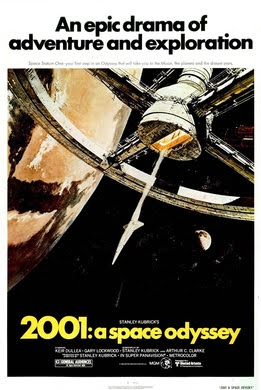Movie Night at the Virtual Cinema: 2001: A Space Odyssey
During the COVID-19 pandemic, I’ve been using SKYBOX VR on Oculus Quest to watch movies in a virtual cinema that I didn’t get to see when they were theatrically released. The illusion of sitting in a movie theater is a convincing one, minus any reaction from the (non-existent) audience. It doesn’t change my perception of the films I’ve been watching — I’m just doing this for fun: to whet my appetite for going to the movies, and for a little VR escapism.
Warning: Spoilers ahead.
I hadn’t been born yet when 2001: A Space Odyssey was originally released, but I’ve seen it several times, the first time probably when I was about 10 years old on TV one night. Truth be told, I found it boring (and I wasn’t alone: the film got mixed reviews when originally released), but I gained an appreciation for it in later years.
The film begins during prehistory, with humanity’s ancestors being influenced by a strange alien monolith, before flashing forward to 1999 where a similar object is found buried on the moon. This object, in turn, sends a transmission towards Jupiter, where an expedition is later sent to investigate. The crew of the spaceship Discovery One arrives at Jupiter, only for the ship’s computer, HAL 9000, to famously go nuts. And then it gets weird.
Watching it again recently, for the first time in years, I had a few observations.
First, it was neat to watch it on a big screen — albeit a virtual one. As I mentioned previously, the illusion presented by SKYBOX VR is a convincing one.
I was surprised by how unlikable I found the character of Dr. Heywood Floyd, who leads the effort to keep the discovery of the monolith on the moon quiet. He has a smug air about him. The other scientists and personnel who travel with him to examine this second monolith also come across as lacking the sort of seriousness a discovery like this would (or should?) evoke. When they arrive at the location of the monolith, they all stop to have their picture taken with it.
Astronauts Frank Poole (Gary Lockwood) and Dave Bowman (Keir Dullea) come across very stiff (especially Poole), with some of the dialog being almost Dragnet-esque (was Jack Webb the ghost writer?). And while the film poses some questions, the plot itself is paper-thin. This is probably heresy to fans of director/co-screenwriter Stanley Kubrick and co-screenwriter/original story author Arthur C. Clarke.
But my biggest complaint with the film is it’s pacing. Even though contemporary reviews were mixed, the film is now considered a classic (it was Roger Ebert’s “Desert Island Movie”, and is in the National Film Registry), but despite that, there are long stretches of the film which basically showcase the special effects, not the story. We get to witness Dr. Floyd’s flight to a space station in excruciating detail, lacking dialog and instead accompanied by classical music. When HAL goes nuts and kills Frank, we get a long sequence where Dave heads down to the pod bay, instructs HAL to turn a pod, gets in a pod, and flies to get Frank. And we get a looong sequence of Dave flying to get Frank. Minutes go by where we’re just watching Dave work the controls of the pod. At the time the film was released, there was a fascination with space travel, but was this level of minutiae ever interesting? And then there’s that sequence near the end where Dave encounters the larger monolith near Jupiter. It just goes on and on, with plenty of effects and no dialog. It reminds me of the later film Star Trek: The Motion Picture which tried to replicate this film (and unfortunately succeeded), falling victim to the same problems. I recently completed a personal fan edit of Star Trek: The Motion Picture where I cut a lot of the lengthy effects sequences, including one which was 10 minutes long without dialog.
I did enjoy watching this, but found myself starting to nod off at times. As a humorous aside, SKYBOX crashed with “An unexpected error has occurred” right before HAL turned on the crew. Coincidence?
Some people love this one, but I found it to be a mixed bag.



Comments
Post a Comment